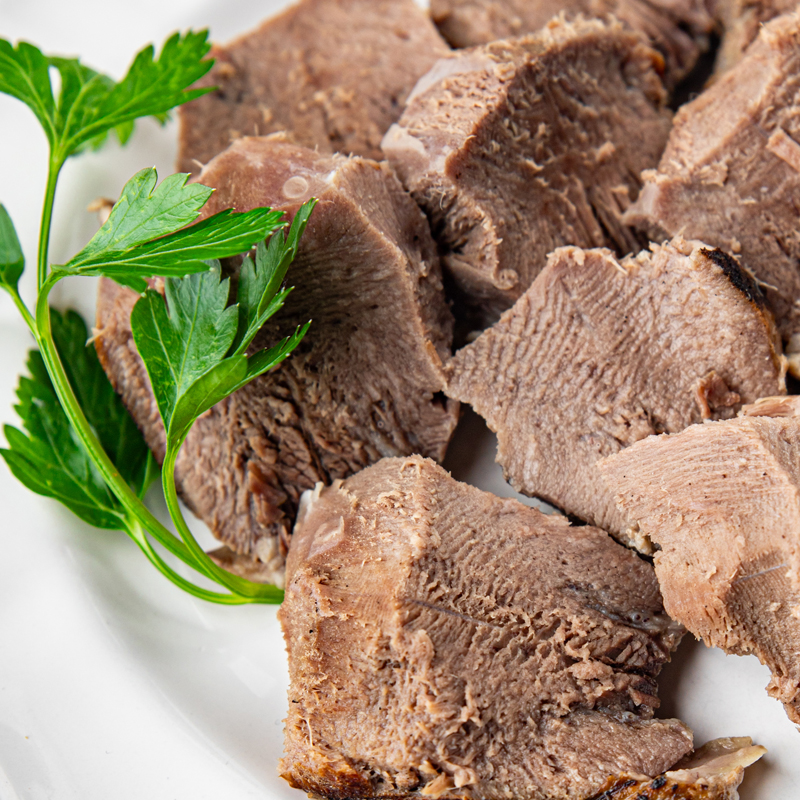
100 gr |
-- |
|
|---|---|---|
| Carbohydrate (gr) | 15.04 |
4928.47 |
| Protein (gr) | 3.59 |
1176.23 |
| Fat (gr) | 12.46 |
4083.43 |
| Fiber (gr) | 1.36 |
445.97 |
| Cholesterol (mg) | 14.64 |
4795.8 |
| Sodium (mg) | 325.27 |
106557.75 |
| Potassium (mg) | 392.16 |
128471.4 |
| Calcium (mg) | 78.15 |
25603.27 |
| Vitamin A (mg) | 46.04 |
15084.01 |
| Vitamin C (mg) | 6.16 |
2019.31 |
| Iron | 0.62 |
203.1 |
Veal tongue is a delicacy in many cuisines, prized for its tender texture and rich flavor. Beyond its culinary appeal, it is a powerhouse of essential nutrients, offering significant health benefits. While its cholesterol content is lower than other organ meats, it still requires mindful consumption, particularly for individuals with cardiovascular concerns.
The calories of cooked veal's tongue are 174 calories per 100 grams.
1. Rich in Folic Acid:
Folic acid is a critical nutrient for DNA synthesis, red blood cell production, and overall cellular health. Including veal tongue in your diet can help support energy levels and reduce the risk of anemia.
2. High in B Vitamins:
Veal tongue is a great source of B vitamins, including B12, which plays a crucial role in maintaining nerve health, producing energy, and forming red blood cells. These vitamins are essential for overall vitality and mental well-being.
3. Excellent Source of Iron and Zinc:
Iron in veal tongue is highly bioavailable, aiding in oxygen transport and preventing fatigue. Zinc supports immune function, promotes wound healing, and helps maintain healthy skin and hair.
4. Potassium for Cardiovascular and Muscular Health:
Potassium is vital for regulating blood pressure, supporting muscle contractions, and maintaining fluid balance. The potassium content in veal tongue makes it a heart-friendly option when consumed in moderation.
1. Lower Cholesterol Compared to Other Organ Meats:
Veal tongue contains less cholesterol than other organ meats like liver and kidneys, making it a slightly healthier choice for those concerned about cholesterol intake. However, moderation is still key, especially for individuals with pre-existing heart conditions.
2. Not Recommended for Heart Patients:
Despite its lower cholesterol content, veal tongue is still considered an organ meat and may not be suitable for individuals with heart disease. It’s advisable for such individuals to opt for leaner protein sources to reduce cardiovascular risks.
Veal tongue is used in a variety of dishes worldwide, known for its tender texture and ability to absorb flavors. Popular preparations include pickled tongue, tacos de lengua in Mexican cuisine, and slow-cooked tongue in stews or soups. Its versatility makes it a prized ingredient in many traditional recipes.
<2>Sustainability and Ethical Eating
Consuming veal tongue supports the principle of nose-to-tail eating, reducing food waste and promoting sustainable meat consumption. This approach maximizes the use of the animal and aligns with ethical eating practices.
Veal tongue is a nutrient-dense food offering a wealth of health benefits, including high levels of folic acid, B vitamins, iron, zinc, and potassium. With lower cholesterol compared to other organ meats, it can be a healthier alternative for those without heart-related concerns. When prepared thoughtfully, it serves as a delicious and sustainable addition to a balanced diet rooted in culinary tradition.